Farmer John Writes: I Learned it in Spain
Harvest Week 16, Deliveries of October 3rd – 7th, 2023
The Cover Crops and the Weather
The fall peas are growing nicely in this warm weather after a few rains. They are adding to the fertility and soil life for next year’s crops.
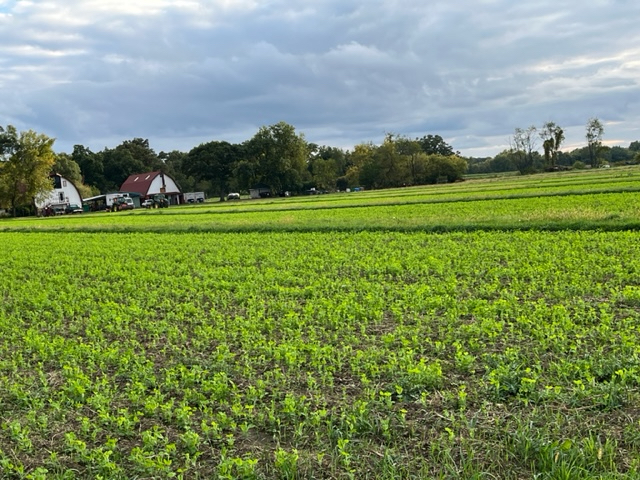
field after field of fall peas
Community Supported Agriculture Confronts Consumerism
We got behind in customer service, way behind, due to understaffing and an astounding volume of customer emails. Nathan, Haidy and I are trying to slog our way out of this predicament. It’s tough, though, because every day many, many more emails arrive from shareholders. Sometimes a shareholder will even write daily for an answer, even though our automatic reply pleads for mercy. We process the current ones first, because once a ticket (customer email) ages, it becomes more and more cumbersome and time-consuming to process it. The aged ones, for the most part, have to wait, even though this might seem counterintuitive. We plan to be current with the backlog by the end of October.
Customer service requires a range of skills and aptitudes from data management to communication skills to being deeply familiar with our shareholder management platform CSAware and our customer service platform Freshdesk. And, the person doing our customer service needs to know a lot about how our CSA program works, and how the farm works. Even the most seemingly simple administrative task for managing customer service can send me into a tailspin (and I already know a considerable amount about all of it and can type without looking at the keys), so it’s not something we can easily transfer to even a highly qualified candidate without proper and extensive ongoing training, which we are unable to offer until the season winds down.
You know that I am fanatical about timeliness with our crops. Get them in on time! The most important standard that one can apply to farming is timeliness, because that has the most chance of anything a farmer can do of creating bounty. Due to circumstances, we (and some of our shareholders) have suffered from lack of timeliness in our office.
I have become the dispatcher of the emails. I assign them to Nathan, Haidy or myself. I see all the emails that come to email hidden; JavaScript is required. I am too busy to do this, but we have to catch up, so I am doing it. It’s good that I am doing it, because I see the types of concerns/requests that our shareholders have. Many of these are understandable and appreciated. Some make me realize that certain shareholders do not read Farm News, do not read anything that has to do with their CSA membership, and that would include the Shareholder Agreement, which includes:
“I will read all emails from the farm and I will thoroughly read the popular weekly Farm News that is both emailed to me and included with each vegetable box that I receive.
If I don’t read all of my correspondence from the farm and if I don’t read the weekly Farm News, I am not fully participating in the Angelic Organics Community Supported Agriculture program. I will make sure to read Farm News so as not to burden the farm office with extraneous questions.”
Of course, many of the culpable shareholders will never read this issue of Farm News.
The Shareholder Agreement also includes:
“Constructive criticism, tactfully presented, is welcomed by the farm, as the farm is always striving to improve its services to shareholders. I will only offer constructive criticism if I am current in reading farm communications, as my concerns are likely to already be addressed by the farm in its correspondence.
The farm conducts all communications to shareholders with respect. I promise to also conduct all communications to the farm with respect. I know that the farm is on my side and wants the best possible outcome for my CSA experience. I will not be rude, mean or hostile in my communications with the farm.”
I have been informed by a few shareholders that they do not like to encounter negativity in Farm News (such as this commentary on customer service). Understood. However, I struggle with the volume of communication from shareholders that make it clear they are not playing their part in Community Supported Agriculture. I should not have to explain again and again in correspondence that we substitute crops if we have to, that there is a deadline for putting a hold on a box, that it is not the farm’s responsibility if a shareholder forgets to pick up their box, etc.
It is an enormous task to deal with shareholders holding us to an impossibly high standard while they are not being the least bit accountable to their agreement as shareholders. If we grew crops without accountability, there would be no farm. If shareholders engage no accountability to their agreement for joining our CSA…well, I am not sure how to handle it. I suppose I should just freely cancel them, but then we have already used their money to put in the crops for their share. Cancel them with no refund, I suppose, as they agreed to uphold their agreement and they didn’t.
Maybe this is the answer, just cancel shareholders who don’t keep their agreement and offer no refund. Maybe one warning. Maybe none. I would rather be growing your crops than spending my precious time placating unaccountable shareholders. I’m sure it does not sit well with those many of you who are fabulous, responsible, respectful, and appreciative members of our CSA that I am way too diverted in my focus and emotions into correspondence with shareholders who are not properly engaging our CSA—not keeping their agreement.
Here is an example of the kind of situation that might populate shareholder emails to the farm: Lettuce—we had to substitute lettuce mix for head lettuce last week because of weather circumstances. It turns out that some of our shareholders simply do not want lettuce mix, and this registers in customer service as complaints. However, we had no head lettuce to offer, the sort of situation that occurs from time to time because we are a farm, not a store. If you don’t want to accept, even embrace, substitutions, you should not be part of our CSA, as occasional substitutions are unavoidable.
I’ll close this section with an ironic observation: Here at the farm, we live hour after hour, week after week, season after season into planning and growing and safeguarding your crops. It is our way of being in life—committed and engaged. Some of our shareholders clearly do not invest in the slightest in their agreement to read the updates about their CSA, yet they hold us to an impossibly high standard, demanding services that we never agreed to and cannot possibly provide. Hmph! to that.
A sincere thanks to the majority of you shareholders who love and honor our CSA.
The Crops
This week, it seems that we will be blessed with warm dry weather through Wednesday. Beyond our regular harvesting, we hope to get our potatoes, daikon radishes, and carrots out of the ground. Later, the fields don’t really dry after rain, which makes the harvesting of root crops somewhere from challenging to impossible.
Faster than a disgruntled shareholder can reach for her phone to submit a blistering complaint, we will mobilize the crew and the equipment to extricate tens of thousands of pounds of your beloved fall crops to safety.
Spinach—if you ordered spinach this week, it probably has weeds in it—some, not a lot. However, it was taking our crew too long to get the weeds out, so I decided to ask our shareholders to sort out the weeds. Is that a little like volunteering?
Bok Choy—splendid.
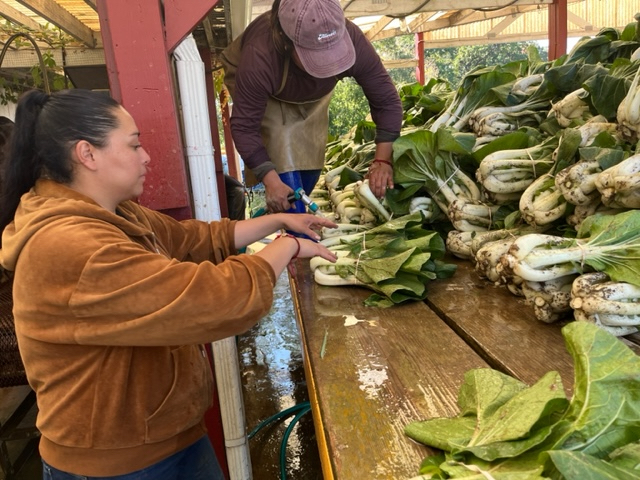
Mayra and Maythe wash bok choy
Brussels Sprouts tops—wow, very popular with our shareholders. One person wrote and said, “I ordered Brussels sprouts and got something else, some leafy things. I don’t want them. They’re only good for the compost.” Well, this sort of thing unfortunately happens, in spite of there being a photo of Brussels Sprouts tops in the customization section plus the descriptive word Tops. Topping the Brussels sprouts should result in bigger sprouts for you soon.
This week, we don’t have enough Brussels sprouts tops to satisfy all the customization orders. We will therefore substitute actual sprouts on the stalks for some of you—a picturesque, sort of primitive presentation. Normally, we don’t give Brussels sprouts until they experience a few sweetening frosts, but in this case, because we substitute with a like crop as best we can, we will substitute with actual sprouts.
Peppers—lots of peppers to give this week; some of them have turned color—unusual to have peppers in early October, but not unprecedented.
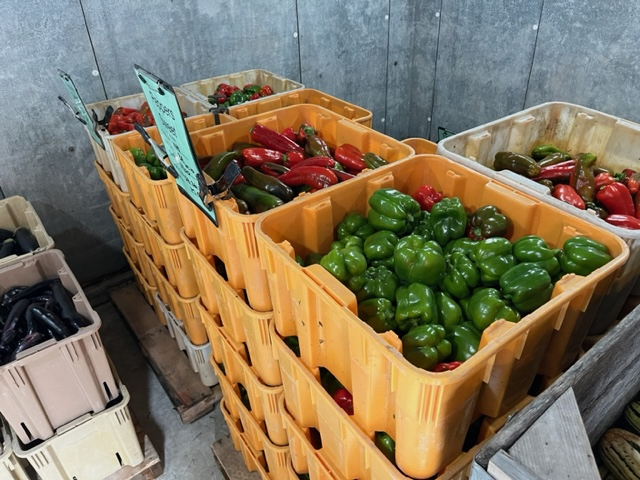
columns of sweet peppers
Eggplant in October—huh? Is that the name of a song?
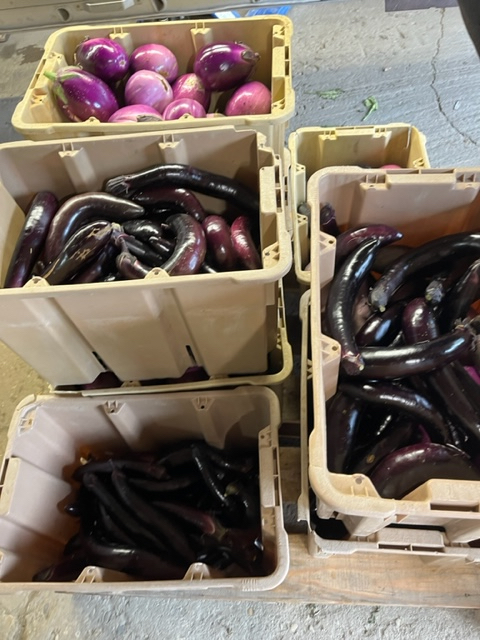
eggplant
Kohlrabi—lots of them and lovely.
Not yet: fall beets and lettuce—went in the ground late, so we are covering these crops with row cover to capture heat. This will trick them into thinking they are 200 miles south of here with correspondingly higher temperatures.
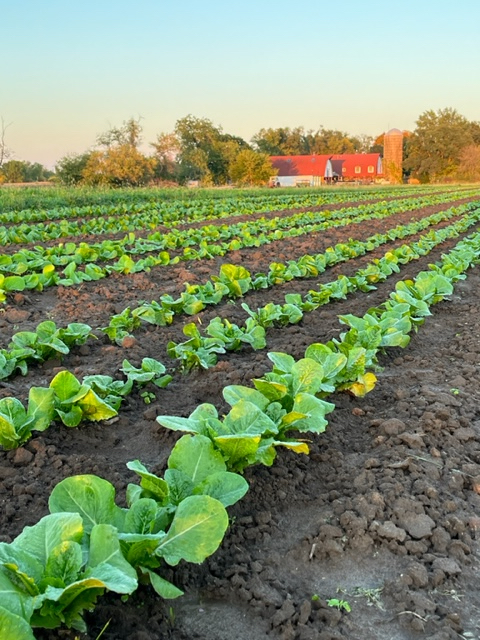
Will this lettuce make heads by frost? Might, if covered.
Soon: More potatoes. Carrots. Daikon radishes—looks like a great yield for the Daikons…might even offer the tops, though they are looking a bit frayed, so that decision will come later.
There’s more not mentioned above for this week and, of course, more to come in future weeks.
Tall Table Tapas Tip
A woman volunteered to help us pack last Thursday—her first time. She had spent maybe 10 years in Spain, I found out, because I am curious and blunt. She had decided to track down a farm where she could volunteer. She had never been on a farm before, so I really didn’t know what to make of this impulse to be on a farm, her never having been on a farm. It did seem exotic to have a woman from Spain on a farm for the first time.
I was thrown back to my time in the Mediterranean countries, the passion, the drama, the night life, tears, hugs, the hospitality, the emphasis on living over working.
Farmer John: “I presented a film about my life and the farm, The Real Dirt on Farmer John in Valladolid—beautiful old city, a former capital of Spain, crumbling a bit now.”
Volunteer: “Ah, yes, a wonderful old city.”
Back story: I was assigned a personal handler in Valladolid, which didn’t often happen at film festivals, and I think the director of the film, Taggart Siegel, got his own handler too. Or maybe we shared a handler. I can’t quite remember. Anyway, this handler showed us the night life in Valladolid, which of course included visiting a tapas bar. (For those unfamiliar with the term, a tapas bar is a place where snacks or appetizers are served, especially with drinks.)

Valladolid
Farmer John: “I loved it in Valladolid, even though I was only there for a couple days—incredibly friendly people. We were flooded with hospitality, drinks, food, and questions. I learned something very important at the tapas bar I went to: no sitting on chairs at tables, only standing at the tall tables—that’s the way to mingle. You can’t mingle sitting down. You meet a ton of people while standing and mingling, hardly anyone when sitting.”
I’d kind of realized this earlier, when I would invite members of the film audience to a nearby bar, where especially the ones who were too bashful to raise their hands in the Q&A at the theater would say (sometimes whisper) what they needed to say at the bar. But, since I was the subject of the film, I was always invited to sit at a table, which meant no mingling. Sitting is not mingling. I usually wouldn’t sit; I would stand at the bar and let people come up to me.
In Valladolid it crystallized—the importance of the tall tables and standing at one. Vibrant social life revolves a bit around tall tables. It’s important to always have the option to remain in conversation at a table or graciously excuse oneself and go stand at another table, then another. (Sometimes, there are stools at the tall tables, but it is also easy to mobilize from a tall stool, vs a chair.)
Why might I leave a table, you might ask? Too opinionated, too dogmatic, too loud. (I mean the others at the table, not me, of course.) I would also leave if we didn’t share a language, or if there were people at other tall tables looking my way wistfully, or if they were just plainly beckoning me.
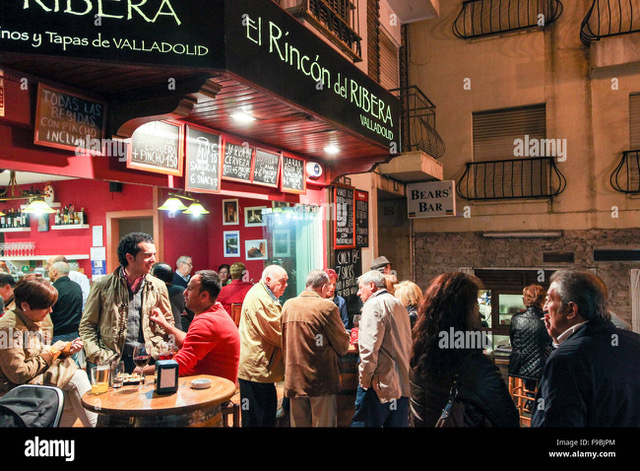
tapas bar conviviality: stock image of standing in Valladolid tapas bar
At my recent class reunion at Beloit College, there were a few tall tables where people mingled, and many regular tables where people sat for the whole evening, inattentive to their former classmates plunked at other tables. Of course, sitting at tables for dining can be the perfect way to socialize around food; these things always depend.
If airlines adopted the tapas bar model—imagine all the people you could meet (or graciously avoid) on a flight until the plane hit turbulence.
Is this tall table tip about food? Sort of. It’s a socializing tip around food, and food is about socializing.
Warmly,
Farmer John
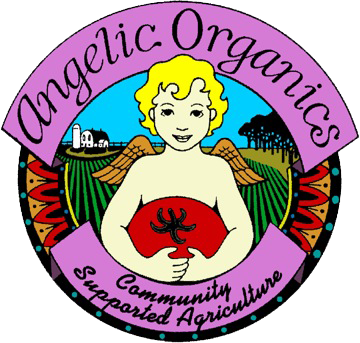
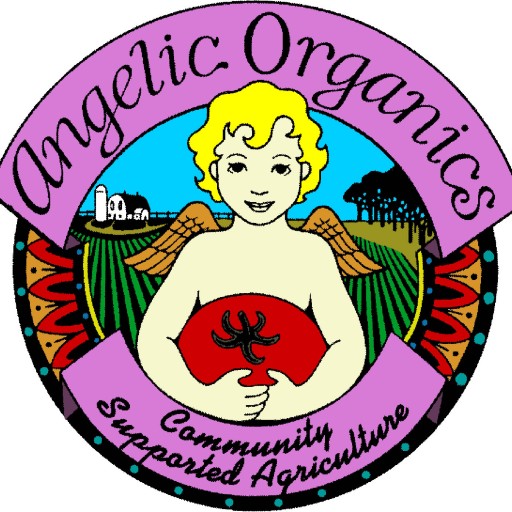
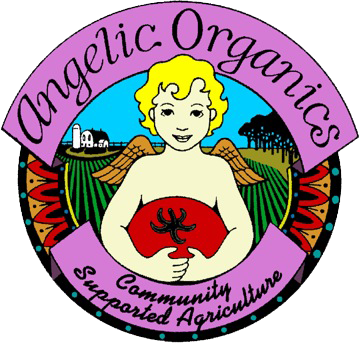

“It is an enormous task to deal with shareholders holding us to an impossibly high standard while they are not being the least bit accountable to their agreement as shareholders.”
I appreciate your attention to relationships, Farmer John. Everything is a relationship, but many of us gotten out of the habit of seeing things this way. Thanks for letting us in on the drama of the farm and for putting us back in proximity to one another. There is real, messy, important work being done by your team – and the CSA model asks for our attention and care in response to that work. We can quibble about tone, but the message rings true. Thanks for the reminder, as always, that we are building a more humane alternative to the vending machine transaction!
Margy, Thank you for your warm acknowledgement. I like not being a vending machine.
Brussels sprouts TOPS. Clearly labeled “tops,” we still didn’t know quite what to expect, but gave them a try. Our daughter, working this year at Natural Roots Farm in Western Massachusetts, chuckled knowingly when we described what we had received and didn’t know what to do with. “Yes,” she said, “we cut those off so the plant will put its’ energy into making better brussels sprouts. I’m not sure what to do with them either.” But a quick trip to the internets showed the way! Not sure if they’ll become a ‘waiting for favorite,’ but my fear of big leafy greens is diminished by knowing that you can probably chiffonade them into some olive oil with garlic and a bit of salt and pepper and you’ll have something edible.
Thank you, Farmer John and the entire crew, for what you do: for giving us something nourishing, for giving us something to think about, for giving us something to learn.
Interesting what you write about the Brussels sprouts tops–it balanced out what a disgruntled shareholder wrote–that she never ordered tops, though her customizion archive was clear that she had ordered Brussels sprouts tops. She threw the tops away and demanded a refund. Notice that you thought you did not order Brussels sprouts tops, then determined that you did order them, and then made your experience a positive one. You had a choice and decided to make the best of it; the other shareholder had a choice and created a big fuss about it, insisting she never ordered them and demanding a refund.
I asked a field worker recently why he always looked so happy in the morning. He said, “God gives me a choice, so why not choose happiness?”
Oh, no, we knew that we were ordering tops … just didn’t know what they were!! 🙂
God—and Angelic Organics—offered us a choice to try something new, so we did.
I like that you acknowledge that God offered you a choice. That’s what one of our H-2A workers says about how to be in life.